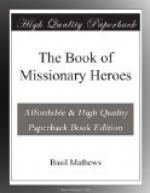After many months of delay at Zanzibar, Mackay with his companions and bearers started on his tramp of hundreds of miles along narrow footpaths, often through swamps, delayed by fierce greedy chiefs who demanded many cloths before they would let the travellers pass. One of the little band of missionaries had already died of fever. When hundreds of miles from the coast, Mackay was stricken with fever and nearly died. His companions sent him back to the coast again to recover, and they themselves went on and put together the Daisy, the boat which the bearers had carried in sections on their heads, on the shore of Victoria Nyanza. So Mackay, racked with fever, was carried back by his Africans over the weary miles through swamp and forest to the coast. At last he was well again, and with infinite labour he cut a great wagon road for 230 miles to Mpapwa. With pick and shovel, axe and saw, they cleared the road of trees for a hundred days.
Mackay wrote home as he sat at night tired by the side of his half-made road, “This will certainly yet be a highway for the King Himself; and all that pass this way will come to know His Name.”
At length, after triumphing by sheer skill and will over a thousand difficulties, Mackay reached the southern shore of Victoria Nyanza at Kagei, to find that his surviving companions had gone on to Uganda in an Arab sailing-dhow, leaving on the shore the Daisy, which had been too small to carry them.
On the beach by the side of that great inland sea, Victoria Nyanza, in the heart of Africa, Mackay found the now broken and leaking Daisy. Her cedar planks were twisted and had warped in the blazing sun till every seam gaped. A hippopotamus had crunched her bow between his terrible jaws. Many of her timbers had crumbled before the still greater foe of the African boat-builder—the white ant.
Now, under her shadow lay the man “who could turn his hand to anything,” on his back with hammer and chisel in hand. He was rivetting a plate of copper on the hull of the Daisy. Already he had nailed sheets of zinc and lead on stern and bow, and had driven cotton wool picked from the bushes by the lake into the seams to caulk some of the leaks. Around the boat stood crowds of Africans, their dark faces full of astonishment at the white man mending his big canoe.
“Why should a man toil so terribly hard?” they wondered.
The tribesmen of the lake had only canoes hollowed out from a tree-trunk, or made of some planks sewn together with fibres from the banana tree.
At last Mackay had his boat ready to sail up the Victoria Nyanza. The whole of the length of that great sea, itself larger than his own native Scotland, still separated Mackay from the land of Uganda for which he had left Britain over fifteen months earlier.
All through his disappointments and difficulties Mackay fought on. With him, as with Livingstone, nothing had power to break his spirit or quench his burning determination to carry on his God-given plan to serve Africa.




